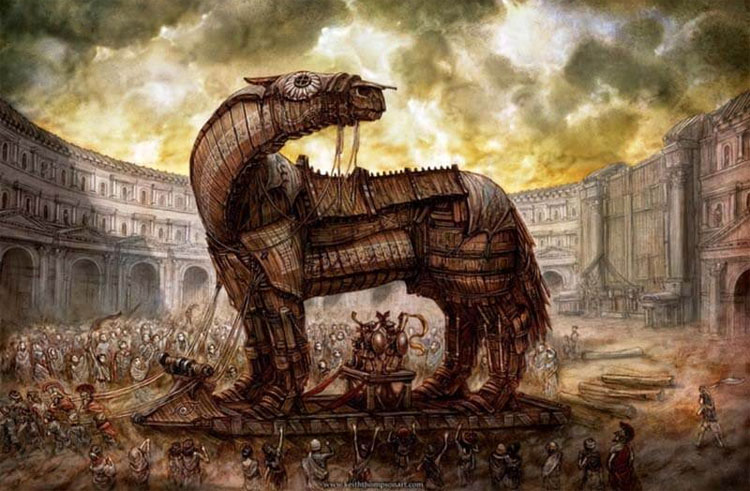Troy ruins ruins on the hill of Turkey
The researchers found traces of a large ancient city with massive walls buried under Hisarlik hill in Turkey.
When Homer 's Iliad was first written in the 8th century BC, the Trojan War became a familiar folk tale.
Thanks to word of mouth culture, people know about the long siege, the battle of survival is outside the city and the ruse helps to win.
In the end, the whole city flourished in the sea of fire and never recovered. But does Troy really exist?
At the time of archeology began to shape in the nineteenth century, many people doubted the completely fictional, mythical story drawn by the imagination of the heroic era. But some scholars believe that, behind extraordinary exploits and wonders must hide historical truths, a real war has occurred somewhere.Frank Calvert is also among them.

Trojan horse.
He spent all his youth going and learning about ancient civilizations, before joining his brother Frederick to the Anatolia region of Canakkale according to diplomatic mission.
Here, Homer described the Greek settlement at the mouth of the River Scamander. Here, fate brought Frank to meet the journalist and geologist named Charles Maclaren.
Locals have long speculated that Troy is probably located on one of the surrounding hilltops.
Maclaren became one of the first to publish a detailed study of the area. He believed that he had found a 32- meter- high landmark known as Hisarlik , derived from the Turkish word for 'fortress'.
Immediately after meeting Maclaren in 1847, the Calvert brothers bought 810 hectares in this area, including the hill.
Before they could discover more, the Crimean war broke out and hindered their archaeological ambitions for many years. After the war ended, Frank Calvert began to study the position, but lacked the budget to conduct a comprehensive excavation. This is when rich German merchants and amateur archaeologists Heinich Schliemann appear.
At Calvert's invitation, Schliemann visited the land in 1868 and decided to excavate it. Excitingly searching for the old city, Schliemann dug a lot of tunnels around the foot of the hill. Here, he discovered treasures were precious artifacts, jewelry and metal items, including two crowns and a bronze shield.
From this discovery, Schliemann is credited with finding Troy and the treasure of King Priam. But the real treasure is somewhere else.

UNESSCO has recognized Hisarlik as an ancient Troy ruins.(Illustration).
When the next archaeologists studied this position, they found that the soil consists of at least 9 cities, the new part built on the collapse of the previous stratum.
Schliemann's discoveries date back to the Mycenae period, 1000 years earlier than Homer. But in soil tissue are authentic evidence of a city that once flourished during the Bronze Age with coal stone and broken arrowheads, broken human bones revealing a violent end. It is Troy VII , buried in the cultural strata in the middle, now devastated again by the careless excavation of Schliemann.
The 200,000-square-meter settlement and the residence of 10,000 people, flourished until about 1180 BC.
The location at the south entrance of the Dardanelles creates a strategic location for both defense and trade. Most importantly, there is still the remains of the massive wall, perhaps the wall Priam and Hector watched as the Greeks approached. Of course, it is difficult to ascertain whether these remnants are from ancient Troy and scholars are still debating, whether Homer's war of war describes whether it really happened.
However, with convincing evidence, UNESSCO recognized Hisarlik as an ancient Troy ruins .
- Discovering ruins of Tran dynasty Buddhist architecture
- Troy has never been a busy city?
- Unearth Troy
- Discovered the remains of the ancient city built by the former Trojan prisoner
- The largest 3,000-year-old castle on the bottom of Turkey
- Traces of the king's golden throne defeated Troy
- The mystery of the 'strange' hill: Where the car shuts down still up the slope
- Survive miraculously after 4 days buried by earthquake
- 'Troy horse' kills cancer
- Why is turkey a traditional Thanksgiving dish?
- Earthquakes in Turkey killed 1,000 people
- Divrigi cathedral and hospital (Turkey)
 Discovered an ancient centipede fossil 99 million years old
Discovered an ancient centipede fossil 99 million years old Discovered bat-like dinosaurs in China
Discovered bat-like dinosaurs in China Discovered a 200-year-old bronze cannon of the coast
Discovered a 200-year-old bronze cannon of the coast Discover 305 million-year-old spider fossils
Discover 305 million-year-old spider fossils